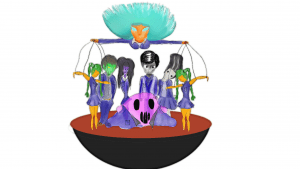Teachers’ Stories: Teaching At A Secondary School
It all started during one fine interview at a Dutch private secondary school. Without being qualified to teach children, my CELTA (Cambridge English Language Training for Adults) was enough for me to get the job. Usually, when applying at schools, candidates are expected to be a ‘1st grade’ teacher, which requires a special type of training. After getting the green light to teach there, I thought I had had a stroke of luck.
Subsequently, I was shocked to learn that many of my students had ADD, ADHD, epilepsy and more; there had been no mention of having to face pupils with all sorts of psychological issues. Apparently, it is considered a stigma by rich parents to have their children labelled in this way. What may seem even more shocking is that there was no ‘special needs’ training to equip me with for the year ahead. What became more and more apparent was that I had been thrown in at the deep end, although I had accepted the challenge. Being unarmed with the facts led to a lack of insight into how to deal with various situations, i.e. what on earth would you do if a student had an epileptic fit during a lesson? I wondered. I was given some advice from teachers along the way, who had had more experience than I about how to deal with ADD for one, but this trial and error style mentality is a very Dutch phenomenon: learn how to deal with something after you have made a mistake, rather than the other way around.
Have you had a similar experience?
The Class from Hell
Next, you have students at different levels, who follow different study programmes (not forgetting their psychological or behavioural issues), and who are crammed into a class together as a budget-cutting measure. This dangerous dynamic is bound to cause all kinds of trouble, and boy, was I in for a surprise.
The problem most of the kids had was lack of concentration. One would pace about at the beginning of the lesson and a couple of the boys began one class barging into each other as they entered the room. Paper aeroplanes were thrown at the teacher and once by me (reverse psychology didn’t work), objects were thrown out of windows, lobbed through the window from one floor down, and small balls of paper covered the floors at the end of lessons. These kids are often spoilt or starved of attention from their parents. To make matter worse, those with attention deficit disorders would drink energy drinks before and in between lessons, and this was certainly not cracked down upon properly. The drinks had even been on sale in a school tuck shop for some time. So what could have been a difficult job as a best case scenario, become an impossible one. Some of these rascals were manipulative and selfish, some used foul language and were disrespectful and insolent, whilst others succumbed to peer-pressure and acted up to show off in front of their peers. A few stayed quiet and neutral, while I had to be more of a policeman, a sociologist and a psychologist than a teacher.
On one occasion, the whole class staged a protest, and without any formal teaching qualification or authority they proclaimed an activity useless and marched out of the classroom and straight into the principle’s office armed with their handouts. What made matters worse is that bad behaviour was never properly punished or the punishment never fit the crime. The protocol was to put a culprit’s name on the board, then underline it give them a warning before giving them lines, or sending them to report to the head teacher with a yellow card (as a warning). Sometimes, they were asked to leave the room for a while on a ‘time-out’. Teachers not being backed up by management was the saddest thing (i.e. guilty pupils were let off scot free), and unruliness was seemingly tolerated; the priority was to keep the kids happy and be part of a ‘happy family’, so their rich parents would continue paying the substantial fees.
Meanwhile, the teachers suffered the brunt of this, and in less than a year, there were at least two casualties that came in the form of burn-outs. This is a frightening phenomenon; teachers are being over-worked, and become very ill. There is still a stigma attached to this and surely this needs to be addressed properly on a national level. I heard that at one public school at least, they keep unethically contacting and bothering those who are supposed to be ‘recovering’ from burn-out. In my case, I managed to survive the ordeal relatively unscathed, although I had lost 10 kilos in weight due to stress. Thankfully, as soon as I stopped teaching class 4, I started to feel my old self again.
Have you suffered from burn-out or in other ways? How were you treated? Please let us know.
This job was very different from the one I am used to. As an employee (alongside my freelance work), I had to have a boss again, and, as a school teacher, you have to do all sorts of duties besides the teaching role, and tellingly, without extra payment. Supervising kids in a study room is one. Otherwise, creating material, writing exams and marking are a few of the usual suspects. Of course it is good to gain as much experience with all these things on various levels. Then comes the quality of the material on the syllabus; some books that are written by non-native speakers are actually part of the ‘curriculum’ whilst being riddled with errors. Further, vocabulary exercises require the students to translate words into Dutch from English rather than learn their meaning. I did my best to adapt material wherever possible but this kind of material is particularly damaging to the kids. To shed a little light on this, when I took over class 4, their vocab had been horrendous. I have been told that this is very different at IB (international baccalaureate) schools, where all the students have a much larger lexis.
One thing I heard that grabbed me was that the Minister of Education apparently does not think that teachers deserve to be paid for marking. Surely, teachers do an extremely important job overall and should receive far more than they get. Currently, there is a salary scale and it is far too complicated to explain in full. One thing is that there are pay brackets with various scales and a school can only fill the slots evenly. The head is able to choose who fits into each category, which can be biased. The downside is that there is a cut-off point whereby teachers cannot earn more based on the pay bracket they have been given. So, if their experience merits a higher salary they can only be eligible if the limited spaces have not been filled. It does sound like gobbledegook, doesn’t it? An experienced teacher should be recognised as one in all instances.
Is teacher’s pay where you are an indication of how important they are to society?
With The Benefit Of Hindsight
Teaching children is a very different kettle of fish from giving stress-free lessons to adults. Of course there are some born naturals, often parents, who can handle the pressure. Perhaps all of the unpleasantness I had been subjected to was due to bad karma, as I had really been something of a handful for my teachers back in the day. Despite all the shocking revelations, as a positive person, I can safely write that I learned a lot from the whole experience and will never forget it. On another bright note, the times are changing in some respects. For example, an increasing number of schools are beginning to adopt Cambridge methods and take on their exams, which is certainly a step forward.
What improvements would you like to see where you teach?





